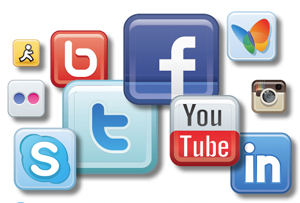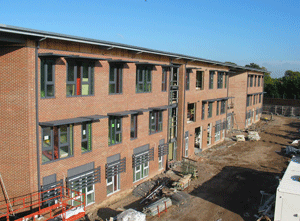
Dave is the head teacher of Cardinal Heenan Catholic High School, Sports College. Latest Ofsted report rated Cardinal Heenan's curriculum as "outstanding". Dave regulary talks at educational conferences, sharing his experiences, war stories and humour with like-minded school leaders.

In today’s teaching world, we are all expected to be “digital natives” and to use all the tools available to enhance teaching and learning. We look to use all sorts of devices to help us communicate, to make life simpler, to be more efficient. We don’t use diaries any more but link our calendar of meetings to our phones or to Outlook. We don’t really need to talk to each other because email, Facebook and Twitter obviate the need for oral communication. We are starting to live in worlds that are hermetically sealed, as our work and social activities become increasingly electronic.
There’s nothing startlingly new in the above paragraph; but with all these new technologies come serious implications for safeguarding. Alarmingly, some teachers are blithely unaware of, or choose to ignore, situations that could cause untold damage to their careers.

I know that we were one of the lucky ones who avoided the cull of Building Schools for the Future because our building work had started and contracts signed. The next wave of Liverpool schools, who had worked so hard on their plans and buildings, were left bereft and cast covetous glances at we five schools who continued their build. They joined with the LA and local business men to attempt a rescue package and have, fingers crossed, united with a design and building company to re-build certain schools all with the same air-hangar infra-structure. And as this progresses, they are more and more looking for advice from our wave of schools to avoid the mistakes made: the stress and the anger; the feeling of the loss of independence and control; contracts signed because of emotional blackmail and brinkmanship. All of these so much a part of our collective experience.
The overhead projector revolutionised the teaching world. It could turn the most mind-numbing lesson into an even more mind-numbing lesson through the power of electricity. Teachers could swap acetates and stories of bulbs fusing at the most inappropriate times, with students stunned into silence by the power of technology. One hour lessons were turned into 20 minutes of learning because the teacher couldn’t get the projector to work or put the acetates upside down.
Next came the photocopier, an educational innovation that has stood the test of time. Reams of paper used world-wide in industry and education. The beauty of this little baby was that it could produce photocopies of one page at a time of the ubiquitous text-book. Clear and multiple copies of page 73 of ‘teach yourself geometry/algebra’, poems could be handed out from Shakespeare’s sonnets, pictures of ox-bow lakes could be glued into exercise books. Or, indeed, if a text book was torn you could photocopy all the book. Lessons didn’t need to be prepared, you just took the text book to the photocopier, join the queue of the other 60 like-minded teachers and your day was done. Some schools even took on a technician to do the photocopying for the staff. At the end of the week, this pale and partially blinded human emerged from a small room carrying large piles of text-books for re-distribution to the staff, secure in the knowledge that they would all be back again the following week. If the copier broke down, hundreds of staff would gather like a lynch-mob at the technician’s door blaming him/her personally for ruining their lessons. Alternatively, the staff would have their own machine which always jammed with no-one accepting the blame.
As I sit here in my office, the head of a large all boys comprehensive, it’s easy to look back at the days free from National Curriculum, massive testing, APP’s, league tables and Ofsted and think how stress free those days were and how free I was to prepare my lessons in any way I saw fit.
Oh yes, walking into school knowing that my imaginative English lessons could be a riot of inventiveness that delighted the students into obedience. And then I hit the text book, filled with pages and pages defining nouns, adjectives and adverbs in dull, black print. Chapters from stories that no-one had heard of and, least of all, of any interest to inner city, Liverpool boys who had never been fox-hunting or to Corfu. Worst of all, you moved from boring text book level one to rigor mortis text book level 5 with nothing else really available until……… along came the banda machine, a revolutionary device designed to liven up any lesson. And what was this technological breakthrough? Well, its main components were: a large drum with a handle; a compartment into which you poured ink; large sheets of paper covered with film which was attached to carbon paper. You filled the drum, attached your sheets of hand-written, innovative lesson planning to the drum, then turned the handle and, miraculously, you had thirty copied sheets of hand-written lesson which you handed out to the awe-struck students individually. There were, however, a couple of drawbacks: the ink, if still fresh, would smudge the sheets into illegibility and cover the students, and your, hands; the success of the sheet depended entirely on the legibility of your handwriting and, if you were very brave and typed your sheet, you could never be sure that the carbon sheet would align with the top sheet, so you had a hand-out that was at 45 degrees.
Next, we had the overhead projector. It was a frightening invention because you needed electricity to use it. You had to plug it in and the bulb lit. Then you placed further hand-written acetate sheets onto its surface and the writing or drawings were beamed onto a screen or wall to the delight of the students and you. But for some this was too much technology and far too risky. What was wrong with text books? Why was the purity of the profession being diluted by this new fangled device? Until one day the penny dropped, you could actually put what was in the text books on to the overhead projector. You could copy or type swathes of pages from the text books and beam them on to a screen or onto the banda sheets. Joy abounded.

A community-driven platform for showcasing the latest innovations and voices in schools
Pioneer House
North Road
Ellesmere Port
CH65 1AD
United Kingdom